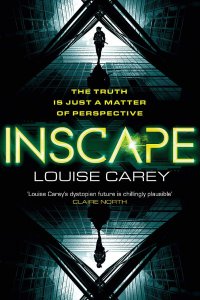Paul Di Filippo Reviews Aspects by John M. Ford
 Aspects, John M. Ford (Tor 978-1250269034, hardcover, 496pp, $26.99) April 2022.
Aspects, John M. Ford (Tor 978-1250269034, hardcover, 496pp, $26.99) April 2022.
I discovered something unique in all my years of reading, upon encountering John M. Ford’s posthumously published novel: it is possible to be both elated and melancholy at the same time. I am elated because what we have here—in nearly five hundred pages of polished text—is a shining, brilliant example of fantasy writing, nothing but pure pleasure and joy… until it tapers off into a fragmentary final chapter, the last bits of the manuscript left protruding, at least metaphorically, from Ford’s silent, gone-cold typewriter when he died suddenly in 2006. The mingled happiness and sadness constitute a literary frisson one does not often encounter. I suppose we should concentrate—and I will—on the positive “aspects” of the book. But the frustration and sorrow inherent in the project are undeniable.
Aspects is what might be called an “urbane fantasy” (to borrow a coinage from author Carrie Vaughn). The more familiar type of fantastika under the label “urban fantasy” (whether from John Crowley on one end of the spectrum to Laurell K. Hamilton on the other), is of course set in the modern world, where the conjunction of the fantastical with the mundane provides the pleasures. Urbane fantasy, on the other hand—and I suppose the “mannerpunk” label is more or less synonymous—is generally set in a subcreation that allows for elaborate systems of politesse and Machiavellian dealings, amid larger-than-life figures. Ford’s book nails this combination with grace and precision, while also giving us a charming love story.
There is a country named Lescoray, whose capital city is Lystourel. The nation is eminently civilized, featuring a middling amount of technology: gas heat, electric lights, photography, paperback printing, railroads, telegraphy, firearms. It also hosts a caste of vari-talented magicians, duels by sword, and lots of horseback travel. This alliance of comfort and convenience with more “romantic” elements begins to conjure up images of our eighteenth-century England, and I think this is plainly Ford’s intent. We will also discover that there are countries analogous to France, Germany, and Greece of the same period. Lastly, the whole current tapestry of nations are the heirs of the vast Quercian empire, which collapsed centuries ago, leading to the Mid-Reigns era. (Rome and the Middle Ages, pretty much.)
None of these parallels are bluntly conveyed or overused. Ford’s powers of invention outweigh any similarities with history books.
The nation of Lescoray is divided into hundreds of duchies, more or less, each ruled by a Coron. Once the Corons were unfettered kings. Nowadays each Coron holds a seat in the Parliament, passing laws, adjudicating policy. Quite a change from the olden days, although nobility still has its many privileges and castles.
Our hero is Coron Varic, a fellow neither young nor old, but seasoned and mature, somewhat dour and damaged. We watch him, in the opening section, win a duel which was covertly prompted by enigmatic foreign conspiracies. Unruffled, he leaves the dueling grounds for a session of Parliament. There he meets the striking and beautiful Coron Longlight, a young Amazonian type from a frontier duchy with whom he almost instantly falls in love. Although this infatuation must be fought for a while, since Coron owes much of his heart to Agate, a female sorcerer to whom he is bound by ties both ethical and supernatural.
The rest of this book moves in a leisurely fashion through a series of rather low-key but endlessly stimulating and alluring events (interrupted by a few assaults and attacks of illness and magical shenanigans) which revolve around the love affair between Varic and Longlight. They spend an end-of-summer holiday together in the fabulous and legendary home of an almost immortal fellow named Strange. Then Varic must return to the capital, while Longlight has to go home to attend to her affairs of state. In Lystourel, Varic tries to fend off a brewing war, while on the road Longlight is mysteriously attacked. There the book breaks off.
What my simple plot outline elides is nothing less than the infinite charm and variety of the book. Besides Varic and Longlight, there are easily a score of other vital, deftly limned characters, from Varic’s fellow Lords to servants and restaurant owners, from soldiers and mercenaries to doctors and mages. Every single one receives Ford’s respectful and clever imprint, so that the whole cast is as rich as any of Dickens’s troupes. Often their natures are conveyed in colorful, sparkling dialogue. Here is the restaurant owner Linnet welcoming his customers:
Linnet came out of the kitchen with a covered plate in each hand, a basket of bread caught in his left elbow. He set them on the table. “I think you’ll find these pleasant. Promise me this, though: my lord Brook, that you’ll taste it before salting it, and, my lord Varic, that you’ll taste it at all while you’re eating it too fast.”
How masterful is that? We get insights into the nature of all three men at once!
Ford’s handling of magic is magisterial and spooky and subtle. Agate’s tortured talents are the prime example of this.
In the water, a few steps out, ripples spread as if a pebble had been tossed in. They were very black in the moonlight. Then the water hardened into the face of a sundial, a pointer of transparent ice arising from the disc.
Consider this invention as well: every Coron’s castle has a Dark Room, a hidden subterranean chamber into which all the psychic malaises of the inhabitants are siphoned, in order to quell unease. The scene in which our protagonists venture into a Dark Room—well, let’s just call it unforgettable.
Ford’s themes are duty and love, responsibilities and longings, redemption and sin. Varic’s pragmatic, utilitarian view of humanity finds contrast among a dozen other perspectives, such as the loving relationship between a soldier named Silvern and his sorcerer “conseil” Edaire. One final thing to mention: the role of women in this society. Accorded full equality, they occupy every possible societal niche. It’s an understated position but very effective and potent.
Even as a fragment, this book deserves to be shelved alongside Cabell and Eddison, Poul Anderson and Michael Moorcock. Could the estate of Ford ever find another writer to carry on the project, as Terry Bisson completed Saint Leibowitz and the Wild Horse Woman, or Brandon Sanderson finished up The Wheel of Time? The search for an equal talent would be a challenge. Perhaps we had best be grateful for what we have.
 While you are here, please take a moment to support Locus with a one-time or recurring donation. We rely on reader donations to keep the magazine and site going, and would like to keep the site paywall free, but WE NEED YOUR FINANCIAL SUPPORT to continue quality coverage of the science fiction and fantasy field.
While you are here, please take a moment to support Locus with a one-time or recurring donation. We rely on reader donations to keep the magazine and site going, and would like to keep the site paywall free, but WE NEED YOUR FINANCIAL SUPPORT to continue quality coverage of the science fiction and fantasy field.
©Locus Magazine. Copyrighted material may not be republished without permission of LSFF.







